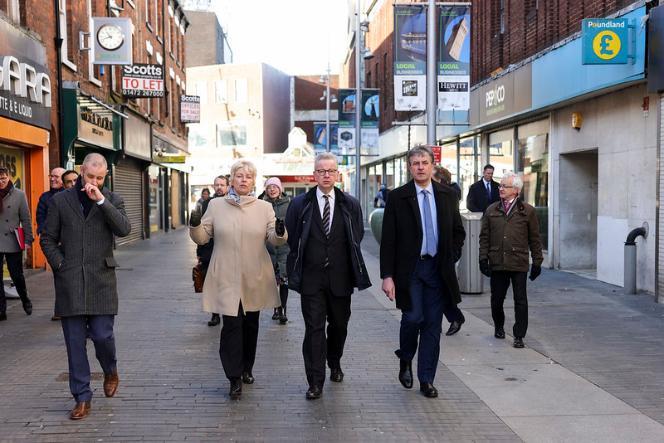Levelling Up: 'Nothing More Than A Rhetorical Device'?
Following the publication of the Government's Levelling Up White Paper last week, Dr Paul Copeland concludes that, without greater regional autonomy across England and the UK as a whole, the promise of the Levelling Up agenda will remain unfulfilled.

Estimated Reading Time: 4 Minutes.
The Government's much anticipated Levelling Up White Paper (published on 2 February 2022) claims to be 'a catalyst for delivering a long-term programme of change to unlock the potential of people and places in every part of the UK'. It includes the ambition to reduce regional inequality by improving outcomes in a swathe of policy areas, such as broadband, transport, skills, education and training, healthcare and the social determinants of health, pay, and crime and policing. In addition, there is funding for regeneration, the cultural economy, community investment, the green industrial revolution, and the continuation of moving some Westminster departments out of Whitehall.
Regional inequality has not only worsened over the last three decades, but has put Britain in the unenvied position of being one of the most geographical unequally-developed countries on multiple measures, including productivity, pay, educational attainment and health. Parts of East Germany have higher levels of GDP per capita than some of the UK's regions. The challenge of the Levelling Up agenda is gigantic, to put it mildly.
To be fair, the aims and ambition of the Levelling Up agenda are something even the most ardent critics would struggle to disagree with. But criticism of the White Paper, and the Government's approach more generally, is widespread. There is very little new money attached to Levelling Up beyond what Central Government would ordinarily spend. Meanwhile, Levelling Up seems to be both everything and nothing. It covers almost all policy areas for which Government has responsibility and there is a danger that the resources committed will be spread too thinly. There can be a lot said for doing fewer things and doing them well.
There is also a much broader debate that needs to be had that politicians from all sides appear unwilling to engage with. The Levelling Up agenda replaces the European Regional Development Funds (ERDF), which were the cornerstone of UK regional development while it was a member of the EU. Yet there is more policy continuity than change between the two.
Ideologically, Levelling Up continues with a supply-side focus on investing in human capital, mobilising private investment, and all the limitations and trappings these policies present when coupled with weak governance. In the 2016 referendum, recipient areas of the ERDF were more likely to have voted to leave the EU than to remain. In other words, the shortcomings of the ERDF contributed to growing regional inequality across the UK meaning that voters couldn't see the benefit of it and thereby EU membership. Post-Brexit, the ERDF is being replaced by more of the same, albeit with policy expansion into some areas that fall outside of the scope of the ERDF, such as policing and health inequalities. Committing more funds to the Levelling Up agenda will do little more than maintain the status quo.

UK regional development requires a reorientation of two fundamental ideas and doing so could lead to genuine long-term change.
First, government needs to move beyond a focus on supply-side policies of skills and training and mobilising private capital. While they may be a necessary condition to reduce regional inequalities, these will be insufficient on their own. The current plan to create a British business bank focuses squarely on mobilising private-led investment. Government needs to be much more supportive and interventionist within the Levelling Up agenda, which requires the creation of a state-backed investment bank that can share risk and encourage private-led investment.
This would create a certain risk for politicians, as some investments may not pay dividends. Yet government policy is littered with waste - think of the £37 billion spent on the not fit-for-purpose Track and Trace system during the Covid-19 pandemic. If such equivalent funds were channelled into a state investment bank, the impact would be truly transformational, even if some investments went sour. Investment in the creation of jobs cannot simply be left to the market. It didn't work in the past and is unlikely to work in the future.
Second, governance structures need to be more autonomous and, importantly, stable. Giving people effective tools to make regional policies that are less dependent on the top-down Westminster approach would be a positive step-change. The intention to create more mayoral combined authorities is a start, but the UK - and England in particular - needs more autonomy at the local level. Meanwhile, these governance structures need to be stable. A feature of the last decade has been the continuous reform of regional development governance structures. This has created uncertainty and short-termism in a field that requires a long-term.
Unless these two steps are taken, the Levelling Up agenda will be nothing more than a rhetorical device to appease northern voters, aimed at claiming central government is tackling regional inequality but with limited progress being made on the ground. While such rhetoric will bolster support for the policies in the short term, over the longer term, the electorate are not so easily fooled.
Dr Paul Copeland is Reader in Public Policy at Queen Mary University of London and Deputy Director of the London Interdisciplinary Social Science Doctoral Training Partnership.